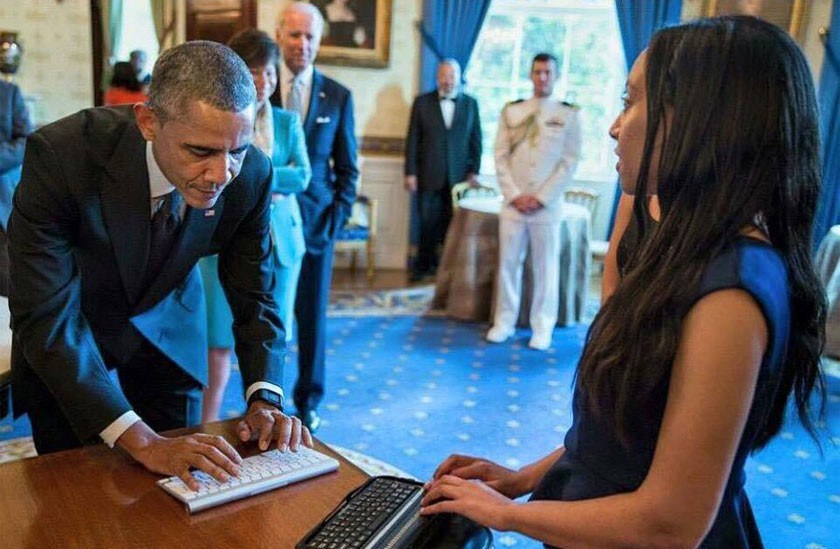
Wednesday August 19, 2015

Using a digital device that displays Braille characters, Haben Girma talks with President Obama at a White House ceremony marking the 25th anniversary of the Americans with Disabilities Act.
The U.S. Embassy salutes Eritrean-American Haben Girma for her courage and determination in the face of physical challenges. We were happy to learn that she was welcomed at the White House to commemorate the 25th anniversary of the Americans with Disabilities Act (ADA) and we congratulate her on becoming the first deaf-blind graduate of Harvard Law School.
Haben Girma’s family comes from Eritrea where she says a child like her, born deaf and blind, is viewed “as a curse on the family” — and certainly not someone you can educate. After her family immigrated to the US, they discovered that children like Haben Girma could excel in school and, two years ago, she became the first deaf-blind graduate of Harvard Law School.
At the White House’s recent ceremony celebrating the 25th anniversary of the Americans with Disabilities Act (ADA), the 27-year-old Haben shared her unique story of how education, legislation, and a desire for chocolate cake set her on the path to a career as a civil rights attorney.
When Haben was born in the US, her family thought they wouldn’t be able to find a school for her: her older brother, also born deaf-blind, had been turned away from every Eritrean school they had approached. But in California, Saba Gebreyesus, Haben’s mother, discovered that her children had the right to an education under the Individuals with Disabilities Education Act (IDEA).
Haben attended a public school in a mainstream classroom, leaving her class for an hour a day to learn Braille. With education, she thrived, and set off after graduation to Lewis & Clark College in Oregon.
But there, a seemingly minor problem in the cafeteria line made her realize not to take for granted the civil rights protections provided under the ADA. Because she couldn’t tell what was available, she would walk up to a food station and take whatever she was given. She wanted to be able to choose; after all, she recalled thinking, “What if there was chocolate cake at Station Four?” The food service manager agreed to e-mail menus for her to print on a Braille reader, but the task was often forgotten or ignored.
At first, Haben was reluctant to push the issue, especially knowing the deprivation her family had faced in a war-torn country. “I’d grown up hearing stories about the war in Eritrea, limited resources, people struggling to survive. It was hard for me to make a fuss about access to cafeteria menus,” she says. “At the same time, I realized after months of not getting access that if I didn’t do anything, other students with disabilities would face a similar barrier.” She took the bold step of telling the cafeteria managers that accommodation was required by the ADA, the response immediately improved, benefiting both her and a blind student who attended the following year.
The experience showed her the importance of enforcing civil rights laws and sparked her interest in becoming a lawyer.
Today, she works for Disability Rights Advocates, a California-based law firm, helping others fight for their rights under the ADA. Haben Girma’s brother also received an education thanks to IDEA and the ADA, and for her family both in the US and abroad, the help they received is nothing short of miraculous; her grandmother, who still lives in East Africa, says it “seemed like magic.”
But Girma knows that it’s legislation that gave her the chance to succeed. As she said to the crowd at the White House, “people with disabilities succeed not by magic but from the opportunities afforded by America and the hard-won power of the ADA.”